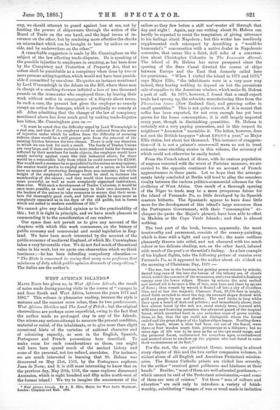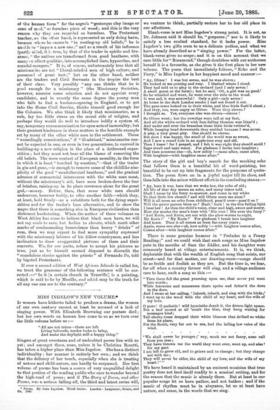WEST AFRICAN ISLANDS.*
MAJOR ELLIS has given us, in West African Islands, the result of notes made during passing visits in the course of "voyages to and from South and West Africa, between the years 1871 and 1882." This volume is pleasanter reading, because the style is matnrer and the manner more sober, than its two predecessors, West African Sketches and The Land of Fetish ; but the original observations are perhaps more superficial, owing to the fact that the author made no prolonged stay in any of the Islands. One misses any serious attempt to measure the present condition, material or social, of the inhabitants, or to give more than slight occasional hints of the varieties of national character and of colonising capacity, as seen in the English, Spanish, Portuguese and French possessions here described. To make room for such considerations as these, one might well have been spared much of the ancient history and some of the personal, not too refined, anecdotes. For instance, we are much interested in learning that St. Helena was discovered on May 21st, 1501, by the Portuguese explorer, Juan de Nova; and it is still more interesting to know that on the previous day, May 20th, 1501, the same explorer discovered Ascension, which is eight hundred and fifty miles north-west of the former island ! We try to imagine the amazement of the sailors as they flew before a stiff nor'-wester all through that
day and night ! Again, any one writing about St. Helena can hardly be expected to resist the temptation of giving utterance to his feelings about Napoleon ; but this writer has needlessly supplemented such retrospect by describing a "would-be humourist's " conversation with a native dealer in Napoleonic souvenirs, that seems like a faint, dull echo of a conversa tion about Christopher Colombo in The Innocents Abroad. The island of St. Helena has never prospered since the opening of the Suez Canal diverted the course of ships between Europe and the East that formerly called here for provisions. "When I visited the island in 1871 and 1873," says Major Ellis, "the inhabitants were in a very poor way indeed, they having nothing to depend on but the precarious sale of supplies to the American whalers, which make St. Helena a port of call. In 1879, however, I found that a small export trade had sprung up, the colonists manufacturing fibre from the Phormium tenax (New Zealand flax), and growing coffee in small quantities." This is not quite correct, if it is meant that coffee has been exported, for not even enough has yet been grown for the home consumption ; it is still largely imported every year, though in diminishing quantities. St. Helena is certainly not a very paying possession, and in this respect its neighbour "Ascension" resembles it The latter, however, does not cost the British taxpayer "about 20,000 a year," as Major Ellis states, but about ten thousand. This instance of exaggera tion—if it is not a printer's error—will warn us not to treat seriously some startling stories in this volume, the accuracy of which could not otherwise be easily tested.
From the French island of Goree, with its curious population of negroes veneered with the worst of Parisian manners, we are carried to the opposite continent for an account of French aggressiveness in those parts. Let us hope that the arrange ments lately concluded at Berlin will tend to allay the senseless rivalry between the various politico-commercial schemes for the civilising of West Africa. One result of a thorough opening of the Niger to trade may be a more prosperous future for the island of Fernando Po, so little developed by its Spanish masters hitherto. The Spaniards appear to have done little more for the development of this island's large resources than the Portuguese Government, with their " consumptive " exchequer (to quote the Major's phrase), have been able to effect in Madeira or the Cape Verde Islands ; and that is almost nothing.
The best part of the book, because, apparently, the most trustworthy and permanent, consists of the scenery-painting, which is done with a light and easy brush ; the main outlines pleasantly thrown into relief, and not obscured with too much colour or too delicate shading, nor, on the other hand, infused with much of the poet's or the artist's feeling. As a fair example of his highest flights, take the following picture of sunrise over Fernando Po, as it appeared to the author about six o'clock on the morning of Christmas Day, 1879 :—
"The sun, low in the heavens, but gaining power minute by minute, darted long rays of fire into the bosom of the billowy sea of clouds which veiled the summits of the mountains, and even trailed a feathery canopy over the lower ridges. Minute by minute the mist melted and melted till it became a film of lace, rent here and there by spears of flame ; then wreath by wreath it floated off into a sky of cloudless blue, and at last the majestic Clarence Peak, 10,100 feet in height, stood forth unveiled to meet the day, its emerald slopes flecked with gold and purple by sun and shadow. The surf broke in long white lines upon a beach of dark-red pebbles ; and immediately above, their feet almost laved by the salt sea, stood stately trees, covered with wild vines and flowering parasites, the advanced guard of the tropical forest, which stretched back in one unbroken mass of green undula. tions, so far, that the eye could not distinguish where the forest ended and the grass slopes of the higher ridges began. Nestling down on the beach, where a slice had been cut out of the forest, were three or four wooden negro huts, picturesque at a distance; but no other sign of life was to be seen as far as the eye could range, and the primeval forest, undisturbed for countless ages, overshadowed and seemed about to swallow-up the pigmies who had dared to raise their excrescences at its feet."
For the rest, the one persistent theme, recurring in almost every chapter of this and the two earlier companion volumes, is violent abuse of all English and American Protestant missionaries. The Roman Catholic priests are visited less severely, for the author "received great politeness and kindness at their hands." Besides, "most of them are well-educated gentlemen,— which cannot be said of the Protestant missionaries,—and some of them are men of science." Yet these "men of culture and education" are said only to introduce a variety of fetishworship, substituting "images of wax or wood made in imitation
of the human form" for the negro's "grotesque clay image or cone of mad," or formless piece of "rood; and this is the very reason why they are regarded as harmless. The Protestant teacher, on the other hand, is represented as only doing harm, because where he succeeds "in rooting-up old beliefs," he is =ibis to "impose a new one ;" and as a result of his influence (partly ailed, it is true, by that of the trader in spirits and firearms), "the natives are transformed from good heathens, with many ex e]lent cpralitie., into accomplished liars, hypocrites, and scandal-mongers." It is, of course, unfortunately true that all missionaries are not "liberal-minded men of high culture, and possesse 1 of great tact ;" but on the other hand, neither are the traders and Civil Servants in the tropics the best of their class. Very possibly "any one thinks that he is good enough for a missionary " (the Missionary Societies, however, exercise some selection and do not appoint every candidate), and in exactly the same degree the young man who fails to find a business-opening in England, or to get into the Home Civil Service, thinks himself good enough for the Colonies. We also think it likely that missionaries, as a rule, lay too little stress on the moral side of religion, and perhaps they would do well to introduce boldly a system of, say, temporary excommunication for open acts of immorality; but their greatest hindrance in these matters is the horrible example set by many of the other white men in the settlement. These "exceedingly conscientious," if " ill-advised," missionaries cannot be expected in one, or even in two generations, to succeed in building-up a new religion in the place of a dethroned superstition; but they must not bear all the blame of removing the old beliefs. The mere contact of European morality, in the form in which it is least "touched by emotion,"—that of the trader in gin and guns,—is enough to remove some of the childlike simplicity of the good "unadulterated heathens," and the gradual advance of commercial intercourse with the white man must, without the missionary's aid, have soon broken-down the fear of fetishes, raising-up in its place reverence alone for the great god,—money. Better, then, that some white men should endeavour, however feebly, to offer another faith—which they, at least, hold firmly—as a substitute both for the dying superstition and for the trader's base alternative, and to show the negro that there is something else in European civilisation than dishonest huckstering. When the author of these volumes on West Africa has come to believe that black men have, we will not say souls to save, but bodies to elevate, which merit other marks of condescending benevolence than heavy "drinks" of rum, then we may expect to find more sympathy expressed with the missionary labours of his fellow-countrymen, and less inclination to draw exaggerated pictures of them and their converts. We, for our parts, refuse to accept his pictures as true, just as he himself seemed disposed to discredit the "scandalous stories against the priests" of Fernando Po, told by bigoted Protestants.
If ever a second edition of West African Islands is called for, we trust the grammar of the following sentence will be corrected :—" In it [a certain church in Teneriffe] is a painting, which is said to be by Murillo, and which may be the truth for all any one can see to the contrary."



































 Previous page
Previous page